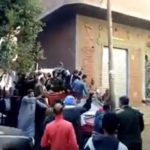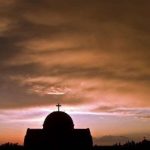By Mada Masr –
Security forces closed a Coptic Christian place of worship in the village of Manshiyet Zaafarana on Friday after an angry mob of Muslim residents surrounded the building and protested its presence in the village, according to a statement issued by the Archdiocese of Minya and Abu Qurqas on Saturday.
Muslim residents surrounded the building and began chanting using “offensive and inflammatory” language, the statement said. Police on the scene responded by promising the protesters that they would “do what they wanted” and promptly closed down the place of worship.
The incident came several days after a number of residents stormed the same building on January 7, a few hours after Christmas mass, prompting police to intervene and remove them from the premises.
Manshiyet Zaafarana lies five kilometers south of the city of Fikriya in Upper Egypt’s Minya Governorate, which is home to Egypt’s largest Coptic Christian population. The archdiocese owns the residence — referred to in the statement as the Mar Girgis Church — which is the only site in which 1,000 Coptic Christians residing in the village can pray.
“Mar Girgis is a designated place to pray and has been owned by the archdiocese for some time,” the statement said.
The Interior Ministry has yet to issue any statement regarding the incident.
The presence of churches and other Christian places of worship has long been a source of sectarian violence in Egypt. Christian worshippers have frequently come under attack by Muslim residents and security forces have done little to hold the perpetrators to account.
Ishaq Ibrahim, a researcher on religious freedoms at the Egyptian Initiative for Personal Rights, confirmed the prayer location’s closure. After speaking with the archdiocese, Ibrahim learned that Copts in the village had been using the house as a place of worship for over a year.
“The situation now is that it’s impossible to build a church in a village where there is no existing one,” Ibrahim explained to Mada Masr.
Meanwhile, MP Emad Gad called into question the position of the newly formed High Committee to Combat Sectarian Incidents regarding the incident. “The committee has not issued anything [on the matter] even though it was formed to combat sectarian violence,” Gad told Mada Masr.
Last month, President Abdel Fatah al-Sisi issued Decree 602/2018 to form the High Committee to Combat Sectarian Incidents, headed by former Interior Minister Magdy Abdel Ghafar, in addition to representatives from the Armed Forces, General Intelligence Services, the Administrative Control Authority and the National Security Agency, according to the December 29 issue of the Official Gazette.
“We were all optimistic about the committee’s formation, especially because it was formed by sovereign entities without the involvement of religious figures. But so far it has done nothing,” Gad said. The issue of religious freedom for Christians “will take a step backward” if the committee does not act, he added.
Meanwhile, MP Nadia Henry issued a statement saying that the 25-30 Alliance requested that the committee fight against the repeated closure of churches in Minya. She said that the request is meant to “prevent and combat further sectarian incidents that are harming the community, in accordance with the law, and to maintain national security and social peace in the country.”
“The people want to worship and pray, but the closure of churches has become a repeated and tolerated crime,” she said in the statement.
The attack in Manshiyet Zaafrana comes after a similar incident took place in the village of Kom al-Raheb in December, which also resulted in police forces closing a church and preventing prayer after an angry mob attacked Coptic churchgoers soon after its opening. The matter ended with a customary reconciliation session, a process that has been criticized for not prosecuting perpetrators of violence against Christians.
Ibrahim said that the recurrence of sectarian violence has been caused by the state’s tendency toward non-intervention. “Perhaps this is the only available space for these people to let out their anger against the state, by taking it out on the weakest link: Christians,” he said.
The researcher also pointed to the establishment of a 10-member Cabinet committee tasked with reviewing requests to legalize churches as a further source of sectarian tension.
Between September 2017 and October 2017, the Egyptian Initiative for Personal documented 15 instances of sectarian tension and violence related to the legalization of 15 churches, which led to the indefinite closure of nine of them.
“In several cases, the attacks took place after local committees visited the church to survey in it in advance of submitting their report to the district church regularization committee,” the EIPR said in a November 2018 report. “Other incidents occurred after lists of churches filed by various dioceses were leaked.”
In August 2016, parliament passed a long-awaited law (Law 80/2016) that governs the building and renovating of churches. While some hailed the passage of the law, it was controversial from the start, with rights activists — who have long campaigned for unified legislation that governs all places of worship in Egypt — criticizing it for being much more restrictive than the equivalent law on mosque building.
Thus far, 627 churches and service buildings have been granted legal status – including 39 that are pending completion of requirements – out of a total of 3,730 applications, since the deadline for applications ended in September 2017.
______________________
https://madamasr.com/en/2019/01/16/news/u/coptic-christian-place-of-worship-shuttered-in-minya-village-after-protests-by-muslim-residents/?utm_source=Project+on+Middle+East+Democracy+-+All+Contacts&utm_campaign=c06cfa9f90-Egypt_Daily_Update_Sept_28_2017_COPY_01&utm_medium=email&utm_term=0_75a06056d7-c06cfa9f90-215933425&mc_cid=c06cfa9f90&mc_eid=8e9e92eefa





